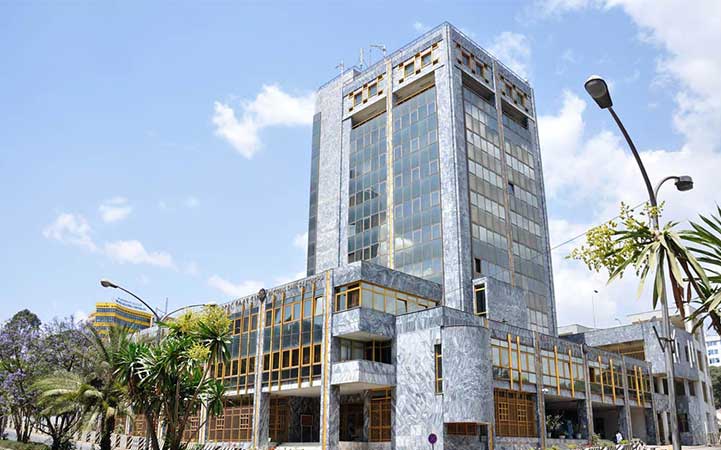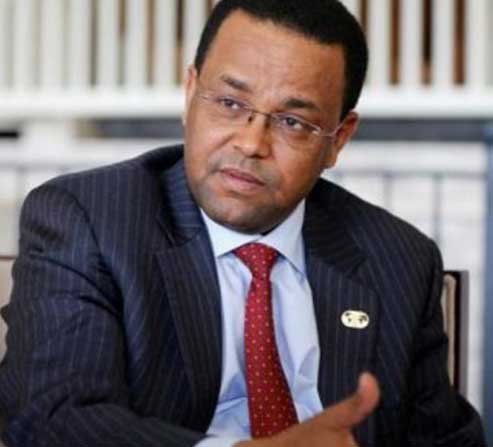
Fortune News | Aug 12,2021
Apr 17 , 2021
By HAWI DADHI

When shareholders of the Bank of Abyssinia decided three weeks ago to beef up their paid-up capital to 10 billion Br, the Bank was positioning itself to get ahead of the curve in the league of its peers.
Last week, the central bank issued a directive compelling every commercial bank to meet a threshold capital of five billion Birr in five years. Banks that have entered the market recently, and those six months away from incorporation, are given seven years to comply.
Signed by Yinager Dessie (PhD), governor of the National Bank of Ethiopia (NBE), on April 12, 2021, the directive decreed that banks in business or under formation should register this amount in paid-up capital at the close of the fiscal year in June 2026. Those unable to meet the requirement will be forced into acquisition or mergers. Authorities at the central bank believe the massive increase in paid-up capital is meant to have the banking industry build up resilience and enable it to keep up with the growing economy. Encouraging financial strength and preparing them for the competition coming from foreign banks is the intention behind the directive, they say.
"We want the banks to be competitive," Frezer Ayalew, director of banking supervision at the NBE, told Fortune. "The central bank doesn't set out limits to the number of banks to be formed, nor does it want to discourage new entrants."
However, the argument that the central bank may want to limit the number of new entrants does have some weight as experts see that a smaller number of banks does not necessarily lead to less competition.
Although financial inclusion is one of the key focus areas of the central bank, a study carried out by the World Bank shows that Ethiopia has a long way to go. The majority of its citizens do not have access to basic financial services due to low bank service penetration. Only 35pc of the people aged over 15 years have bank accounts, according to the Global Index Database for 2017. It is a finding consistent with World Bank's study conducted two years later; 65pc of the country’s population was unbanked.
Last week's move comes a decade after the central bank ordered banks to raise their paid-up capital to half a billion Birr. It was in the mid-1990s that the financial sector was liberalised for the domestic private sector. Shareholders were required to raise 10 million Br in equity, paving the way for the emergence of private commercial banks such as Awash, Abyssinia, Hibret and Dashen.
Recently, there has been a push from the central bank for the commercial banks to boost their capital to two billion Birr, although it was communicated informally. This should be no surprise as the NBE, a regulatory body, gives priority to financial sector stability, says Abdulmennan Mohammed, a finance expert with two decades of experience.
Although the directive has not been met with misgivings, experts in the industry raise concerns. Some private commercial banks may fulfill the requirement within the time set in the directive, but others will have a difficult time.
"A few of them could merge, but some under formation may be forced to dissolve," Abdulmenan said.
The last time a similar directive was announced was 10 years ago, compelling banks to increase their capital to half a billion Birr from the threshold capital of 75 million Br. None of the 14 private commercial banks in operation then were forced to close or merge, but their cumulated capital rose to 43 billion Br. Five years later, the 16 operating private commercial banks have a combined capital of 112.9 billion Br.
Awash Bank leads the pack. Having raised a paid-up capital of 5.85 billion Br, it has already surpassed the new requirement. But its shareholders want to go further on the capitalisation road, raising the Bank's paid-up capital to 12 billion Br in three years. Wegagen and Zemen banks follow with shareholders wanting to increase capital to five billion Birr and six billion Birr, respectively.
Having a capitalisation of 3.3 billion Br, further increases are on the way in line with the Bank's implementation of its strategic plan, Birtukan Gebreegzi, president of Wegagen Bank, disclosed to Fortune.
Zemen Bank's CEO, Dereje Zenebe, sees the directive as an essential tool for growth that helps banks absorb shock and elevate their capacity to provide loans. Formed 13 years ago, Zemen Bank is one of the youngest in the industry; in June last year, its capital rose to 1.8 billion Br.
"If a bank is unable to raise five billion Birr in seven years, it might not be its place," Dereje told Fortune.
Another executive in the industry with an upbeat attitude is Tesfaye Boru, president of Debub Global Bank, which joined the banking industry not long after Zemen. Its capitalisation has reached 1.3 billion Br, a modest standing compared to the giants known as the big five.
The required increase in capital was expected in the industry, and banks have been gearing to push their capital beyond the one or two billion Birr that most have now. According to Tesfaye, five billion Birr in threshold capital may not mean much considering the rate of inflation. He believes the period provided to meet the new requirement is sufficient.
"We can retain the profits in the five years or raise equity from the public," he said. "It will be easier to raise capital when the stock market begins operation."
Smaller banks may have a hard time dealing with the directive though.
Abebaw Zewdie, marketing and corporate communications director of the soon-to-be operational Tsehay Bank, foresees the new entrants may struggle with the new directive.
But Tesfaye believes that they are the ones who should be raising capital as they have less ability to absorb risk. New entrants will have to capitalise themselves and become more competitive even though it will be challenging to raise capital initially.
However, the new directive seems to have been received cheerfully by newly formed banks. Tsehay and Amhara banks are around the corner, raising billions from the public in their initial offerings.
"It presents an opportunity as well as a challenge for us," said Dawit Keno, president of Hijra Bank, a fully-fledged interest-free bank.
Hijra will have to work harder to meet the threshold in seven years, and as the proliferation of new banks is halted, the Bank may have to deal with less competition in the capital market.
Banks like Hijra, which have a segmented market and are operating in a fairly new industry, do not necessarily require as large a paid-up capital as conventional banks, experts such as Abdulmenan believe.
However, the NBE has no intention of treating these banks differently, Frezer told Fortune.
"If what makes them different is them being interest-free, it might need a separate legal framework," he said.
The directive details that banks in business are expected to submit their plans of action in a month to the National Bank of Ethiopia.
"Preparing the plan is not a big problem. The point is, can they implement it?" queries Abdulmenan.
PUBLISHED ON
Apr 17,2021 [ VOL
22 , NO
1094]

Fortune News | Aug 12,2021

Commentaries | Jul 07,2024

My Opinion | Apr 30,2022

Radar | Sep 18,2021

Agenda | Sep 22,2024

Dec 22 , 2024 . By TIZITA SHEWAFERAW
Charged with transforming colossal state-owned enterprises into modern and competitiv...

Aug 18 , 2024 . By AKSAH ITALO
Although predictable Yonas Zerihun's job in the ride-hailing service is not immune to...

Jul 28 , 2024 . By TIZITA SHEWAFERAW
Unhabitual, perhaps too many, Samuel Gebreyohannes, 38, used to occasionally enjoy a couple of beers at breakfast. However, he recently swit...

Jul 13 , 2024 . By AKSAH ITALO
Investors who rely on tractors, trucks, and field vehicles for commuting, transporting commodities, and f...

Oct 11 , 2025
Ladislas Farago, a roving Associated Press (AP) correspondent, arrived in Ethiopia in...

Oct 4 , 2025
Eyob Tekalegn (PhD) had been in the Governor's chair for only weeks when, on Septembe...

Sep 27 , 2025
Four years into an experiment with “shock therapy” in education, the national moo...

Sep 20 , 2025
Getachew Reda's return to the national stage was always going to stir attention. Once...